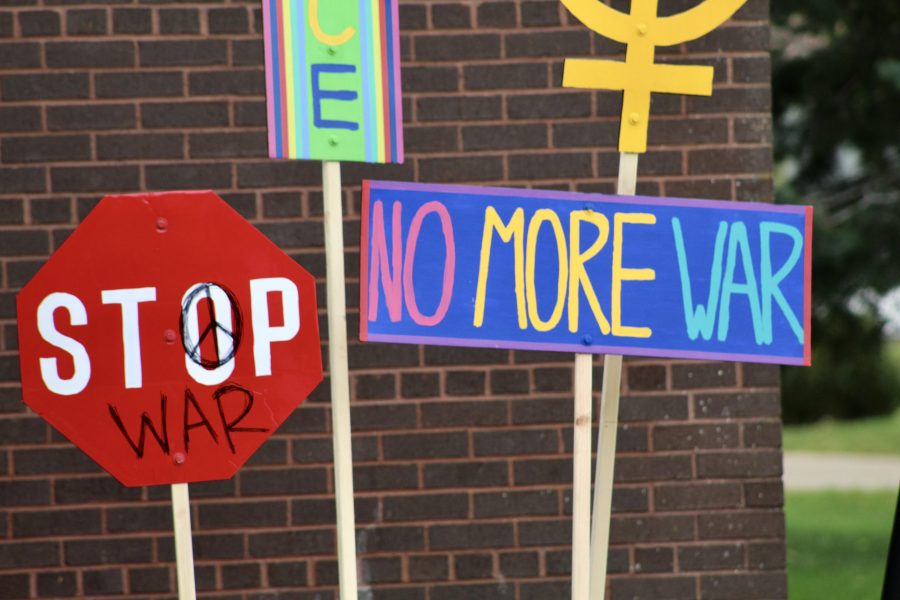“Lysistrata”: A review from the seats
October 25, 2021
On October 8 through10, a group of Viterbo students presented “Lysistrata,” a reimagined take on age-old theatre. The story, originally written in 411 B.C.E., details the endeavors of fictional Athenian housewives and their quest to end the Peloponnesian War through unconventional means. This comedic heart had staying power in the minds of the audience, which was evident as a group of attendees sat down with the Lumen to talk about their takeaways from the unique production.
The themes that came through, the viewers commented, were “Sex and women’s empowerment,” which all members agreed were executed well. In addition, they praised the usage of the venue. “They used the outdoor theatre space well,” Sophia Niblock commented. The simple stage was set with Greek-style pillars crafted to fit over the existing exterior structure with chalk decorating the sidewalk.
“It was cool having actors coming in from all sides,” said David Caliri, a junior vocal performance major. “The beginning of the show contained groups of cast members doing a small performance beforehand to warm up the audience, which was effective and engaging.”
In an online Viterbo news briefing, director Rick Walters, a professor of theatre and music theatre, gave a description of the work’s core purpose and value. “’Lysistrata’ is a funny and very bawdy anti-war comedy that proves once again [that] the old saying is true: ‘If women ruled the world, there would be no war.’ It is a concise, fast-paced production filled with vaudeville elements and slap-stick humor.” The briefing goes on to note, “This new adaptation of the play was created in support of the 2003 Lysistrata Project, a world-wide theatrical protest against the burgeoning war in Iraq.”
“The idea of women working together, taking control, and making peaceful change,” Walters added, “is a strong central theme in “Lysistrata” that makes it as relevant and empowering today as it was in the fifth century.” This peaceful change, as the writer would have it, involved Lysistrata and her fellow Athenian women abstaining from sex with their husbands until they put down their swords. As if to keep this purpose constantly in the audience’s awareness, many characters donned suggestive costumes to enhance the hilarity of the situation. One of the student viewers thus remarked, “I saw my friends in…ways I did not expect.”
To further illustrate how the performance left an impression on him, Caliri noted, “One monologue…by Lysistrata (portrayed by Audrey Accardo) was very emotionally charged and drew me in.” Ellyn Werner, a sophomore music education and vocal performance double major, noted the introduction of “unorthodox props” in a classic theatrical setting. All of the interviewees agreed, “Because it was performed outside, it was great to see everyone’s faces and see live theatre again. It was great to see the personal connection.” The acrobatic and musical acts, they said, showcased each actor’s talents beyond the script.
To Caliri, the production was also “More of a play with music versus just a play” also expressing delight over the presence of Beyoncé hits in the final number. These well-known modern tunes, several remarked, electrified the audience and further conveyed the theme of female empowerment. Overall, the group’s synopsis of their experience could be summed up in Werner’s words, “[The] modern take on a Greek play was enjoyable and exciting.”
Due to weather conditions, one of the two evening performances was moved to the Black Box Theatre. Luckily for the cast and their viewers, Mother Nature came through for the final showings—an evening and two matinees—which were held just outside the East entrance of the Fine Arts Center. Werner noted about this arrangement, “The actors brought larger than life characters close to home.”


